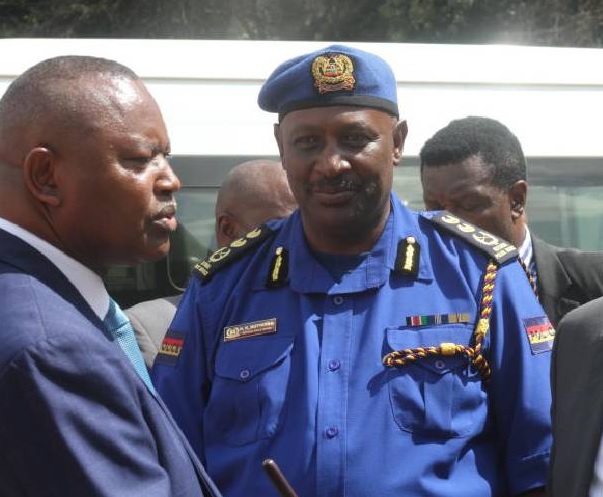For Kinoti, Mutyambai writing was on the wall
By Zadock.Aangira, September 29, 2022When the Supreme Court on September 5 affirmed the election of immediate former Deputy President William Ruto as Kenya’s fifth President, the exit of Inspector General of Police Hillary Mutyambai and Directorate of Criminal Investigations (DCI) boss George Kinoti was a matter of when, not if.
The writing was always on the wall for Mutyambai when, during the campaigns, Ruto labelled him as the “most incompetent police IG in the world”.
The remarks did not sit well with Interior Cabinet Secretary Fred Matiang’i who accused Ruto of being bitter over “business deals.”
“The only problem with Mutyambai is that he refused to buy police boots for Sh13,000 that were being sold by Ruto’s friends. Mutyambai only agreed to buy the boots for Sh2,900.
“He also refused to buy bulletproof vests for 900 dollars sold by your (Ruto’s) friends and opted to buy them directly from manufacturers. That is the frustration that is pushing you to abuse our Inspector-General,” said Matiang’i.
During the campaigns, Kinoti’s name had become one of the most trending among public officers as Ruto and his allies accused him of being used by President Uhuru Kenyatta’s administration to intimidate and harass them using “framed up” corruption charges.
Hospital admission
When the new President announced on Tuesday that he had accepted Kinoti’s resignation, it was no surprise to many.
Though there are claims that Kinoti and Mutyambai were summoned to State House where they were forced to resign, sources at Mazingira House give a contrary account.
Reliable sources indicate that Kinoti had cleared his office from the day the Supreme Court affirmed Ruto’s victory.
Kinoti, a career cop, is said to have tendered his resignation on September 15.
As for Mutyambai, he was admitted to hospital in a critical condition late last month, leaving the head of the Administration Police Service (APS) Noor Gabow to act in his position.
Kinoti, 55, was appointed by Uhuru on January 5, 2018 to replace Ndegwa Muhoro.
With zeal and support from Uhuru, who had vowed to crack down on corruption, Kinoti went for the high and mighty.
The arrest of big fish such as then Treasury Cabinet Secretary Henry Rotich, Principal Secretary Kamau Thugge and 26 others sent chills down the spines of many.
Rotich’s arrest was followed by those of former Nairobi Governor Evans Kidero and Deputy Chief Justice Philomena Mwilu among others.
Kinoti’s name became synonymous with the so called Friday arrests where big shots were arrested and spend the weekend in police cells.
But as some applauded him, others, including Ruto and his allies, saw his actions as political witch-hunt, an accusation that Kinoti denied.
A few days to last month’s election, Kinoti arrested three Venezuelans, who he accused of possessing sensitive election materials that, he claimed, were to be used to manipulate the presidential vote.
The arrest lead to a verbal exchange between Kinoti and the Independent Electoral and Boundaries Commission (IEBC) until some powers at Harambee House intervened.
The forensic report compiled by the DCI was to be used in the Supreme Court in support of the petition by Azimio la Umoja presidential candidate Raila Odinga challenging Ruto’s election victory. This appeared to have been the last straw that broke the camel’s back.
Speaking at a rally in Kapkatet in Kericho in July, Ruto accused Kinoti of interfering in the work of IEBC.
“Leave matters of elections to IEBC because you have no business running an election. You failed as DCI. We do not want you to fail us in this election. Wait for August when you will go home,” the then Deputy President said.
Shortly after their inauguration, Deputy President Rigathi Gachagua ordered detectives attached to government offices to return to the head office on Kiambu Road.
“They have no business in government offices hovering all over and creating a toxic environment,” Gachagua said.
Some cases that put Kinoti on the spotlight included the murder of Administration Police Sergeant Kipyegon Kenei, the arms scandal involving former Sports CS Rashid Echesa, and Rotich over the Kimwarer and Arror dams.
Changes Kinoti brought to the DCI include disbanding the Flying Squad which critics accused of being corrupt and not people-friendly. Instead, he formed other specialised units to deal with contraband, fake and substandard food and other products.
No trace
Unlike Kinoti who has always courted controversy, Mutyambai, a former National Intelligence Service officer, had a quiet tenure at his Jogoo House office.
Unlike his two predecessors, Joseph Boinnet and David Kimaiyo, who were visible during their tenure, Mutyambai chose to keep his own counsel over a number of issues, earning himself the tag of a “Mr Bora Uhai” (as long as I am alive) within the service.
It was during his time that the country witnessed dozens of people either disappearing without a trace or their bodies being found dumped in Rivers Yala, Athi, Maragwa among other places.
Missing Voices Coalition, a Non-Governmental Organisation, says there were 219 police killings and enforced disappearances in 2021. Out of the total number, 187 cases were of police killings and 32 enforced disappearances. Of the 32 cases of EDs, two of the victims were later found alive after a public outcry.
